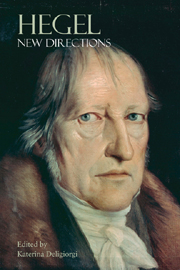Book contents
- Frontmatter
- Contents
- Contributors
- Acknowledgements
- Abbreviations
- Introduction: On reading Hegel today
- 1 Hegel on conscience and the history of moral philosophy
- 2 The apperceptive I and the empirical self: towards a heterodox reading of “Lordship and Bondage” in Hegel's Phenomenology
- 3 Hegel, McDowell and recent defences of Kant
- 4 Substance, subject and infinity: a case study of the role of logic in Hegel's system
- 5 Dialectic as logic of transformative processes
- 6 Hegel, ethics and the logic of universality
- 7 Recognition and reconciliation: actualized agency in Hegel's Jena Phenomenology
- 8 The contemporary relevance of Hegel's practical philosophy
- 9 Catching up with history: Hegel and abstract painting
- 10 New directions in Hegel's philosophy of nature
- 11 Hegel and the gospel according to Immanuel
- 12 What is conceptual history?
- 13 On Hegel's interpretation of Aristotle's psyche: a qualified defence
- Bibliography
- Index
1 - Hegel on conscience and the history of moral philosophy
- Frontmatter
- Contents
- Contributors
- Acknowledgements
- Abbreviations
- Introduction: On reading Hegel today
- 1 Hegel on conscience and the history of moral philosophy
- 2 The apperceptive I and the empirical self: towards a heterodox reading of “Lordship and Bondage” in Hegel's Phenomenology
- 3 Hegel, McDowell and recent defences of Kant
- 4 Substance, subject and infinity: a case study of the role of logic in Hegel's system
- 5 Dialectic as logic of transformative processes
- 6 Hegel, ethics and the logic of universality
- 7 Recognition and reconciliation: actualized agency in Hegel's Jena Phenomenology
- 8 The contemporary relevance of Hegel's practical philosophy
- 9 Catching up with history: Hegel and abstract painting
- 10 New directions in Hegel's philosophy of nature
- 11 Hegel and the gospel according to Immanuel
- 12 What is conceptual history?
- 13 On Hegel's interpretation of Aristotle's psyche: a qualified defence
- Bibliography
- Index
Summary
Conscience, Hegel claims, “represents an exalted point of view, a point of view of the modern world” (PR: §136A). The notion that conscience is indeed closely linked to the experience of modernity has played an important role in a number of approaches to the history of moral philosophy, but these approaches often differ in terms of their accounts of what precisely it is that makes conscience a modern phenomenon. In what follows I want to show what is distinctive about Hegel's view of the modernity of conscience, in the process re-examining some conventional assumptions about Hegel's relation to the history of moral philosophy. I hope thereby to make some contribution to the still not entirely developed philosophical subdiscipline of the history of moral philosophy, as well as to the broader connection it shares with political and religious concerns that were always central to Hegel's treatment of the concept of conscience.
The issue of conscience and the history of moral philosophy might in general be framed at the start in terms of recent discussion of it in Edward G. Andrew's Conscience and its Critics: Protestant Conscience, Enlightenment Reason and Modern Subjectivity (2001), more specifically in Andrew's response to the history of moral philosophy he finds implicit in J. B. Schneewind's The Invention of Autonomy (1998). Andrew's concern is the development of particularly the Protestant notion of conscience between the sixteenth and nineteenth centuries. On the one hand, Andrew sees something of an overall trend in these centuries.
- Type
- Chapter
- Information
- HegelNew Directions, pp. 17 - 32Publisher: Acumen PublishingPrint publication year: 2006



